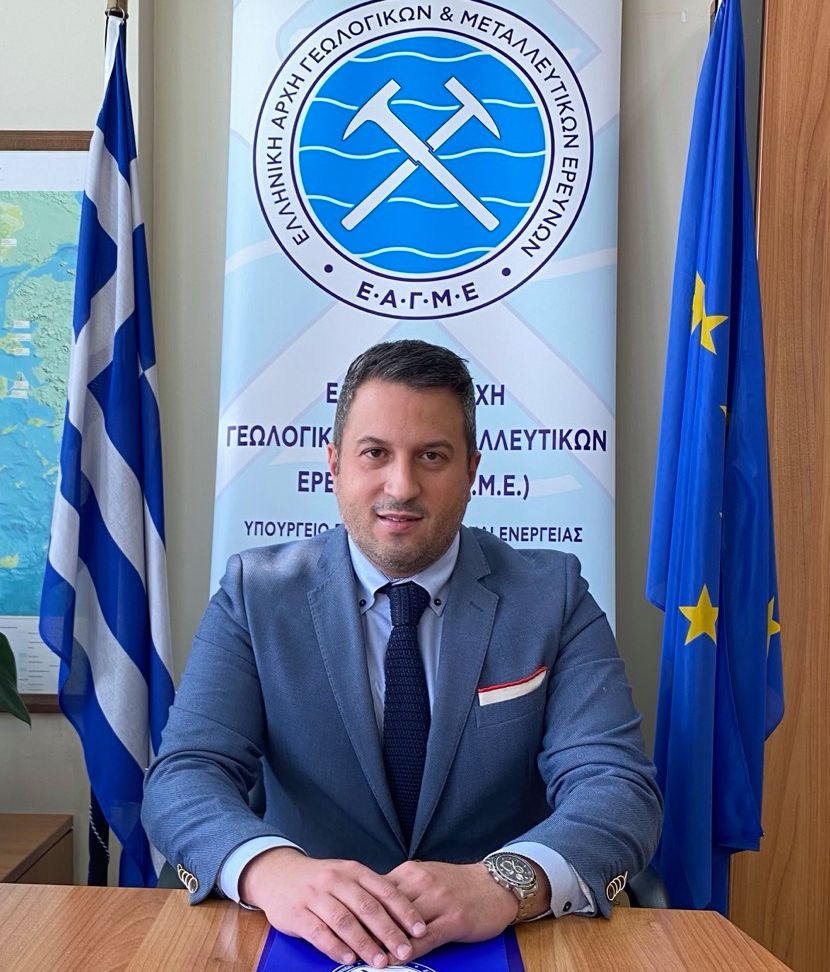The Hellenic Authority for Geological and Mineral Research (H.S.G.M.E.), as the successor of the historic IGME, is the official institutional advisor to the state on Geoscience matters. The mission of EAGME is the investigation and scientific monitoring of Geology and mineral issues, the preparation of studies and the provision of expert opinions, as well as the geological, hydrogeological, geothermal, and mineral research of the country and the sustainable utilization of its subsurface resources.
A few days ago, we submitted our strategic plan for the utilization of the NSRF 2021–2027, structured around the pillars of Geoenergy, Geohazards, Critical Raw Materials, Environment, and Digitalization.
Within this framework, EAGME proposes the implementation of six projects with a total budget of €18,000,000. The successful implementation of these projects relies on the creative collaboration of all our organizational units and, most importantly, on EAGME’s scientific and technical staff, who constitute the organization’s true wealth and its most significant added value for the Greek state. At the same time, the operation of the Authority is guided by a set of core values aligned with its scientific and research activities.
A major objective for us—fully in line with current global priorities—is the development of geothermal and geoenergy potential, and we are ready to undertake the necessary research actions in this direction. This includes identifying new areas of geothermal interest, intensifying the monitoring of existing geothermal fields in the country, and assessing sites suitable for underground energy storage. The expansion of geothermal energy can play a decisive role in enhancing energy security, diversifying the energy mix, improving energy efficiency, reducing dependence on imported fossil fuels, and promoting renewable energy sources.
Another key project in addressing climate change involves the delineation, monitoring, and optimal management of Geohazards in vulnerable areas of Greece. Particular emphasis is placed on areas affected by climate change—such as urban regions, coastal zones, critical infrastructure sites, industrial areas, and cultural heritage monuments—so that appropriate interventions can be proposed in time to mitigate impacts on both the natural and built environment and to safeguard infrastructure and heritage sites.
Equally important for EAGME are the research actions on mineral raw materials supporting the Green Deal and the implementation of the circular economy. Increasing the supply of Critical Raw Materials from the country’s primary and secondary reserves will reduce our dependence (and Europe’s more broadly) on imports of such resources, while strengthening the competitiveness of European technologies for energy production, storage, and transport. Greece’s subsurface can play a vital role in achieving the green transition, combined with improved digital access to updated, high-quality geoscientific data and expertise. The success of the energy transition depends largely on our ability to ensure sustainable energy production and storage—and most of the minerals required for this come from only a few countries worldwide.
Another initiative, also centered on the impacts of climate change, focuses on groundwater abstraction and usage across the country’s aquifer systems. Its implementation will achieve:
- Comprehensive and detailed geospatial and hydrogeological mapping of water abstractions for all uses, correlated with municipal boundaries, groundwater bodies, river basin districts, and environmentally sensitive areas.
- Integrated information for a detailed assessment of the quantitative status of groundwater systems, especially those under “pressure.”
At the same time, we plan to continue our research on the National Groundwater Monitoring Network to record both the quantitative and qualitative status of aquifers, aiming to protect them and reverse any degradation trends observed, ensuring their sustainable use. Greece relies heavily on groundwater, which is estimated to cover approximately 80% of annual water needs for domestic, agricultural, and industrial uses. However, in areas with intensive use, signs of quantitative and qualitative degradation have already been recorded at an increasing rate.
For EAGME, the geological mapping actions—both onshore and offshore—also constitute a mega project, supporting green development, climate change mitigation, and environmental biogeodiversity. These initiatives aim to produce primary geospatial data, process and represent them on maps, and disseminate information through innovative digital products that will serve as the foundation for any green development strategy, delivering tangible benefits to society and the economy.
EAGME is investing in the energy transition, renewable energy sources, and the fight against climate change. The EAGME of the future is an organization at the forefront of the country’s scientific and technological development, playing a crucial role in utilizing NSRF resources and contributing to the national strategy for a low-carbon economy—aligned with environmental challenges and the European Green Deal.
Dionysios Goutis is the General Director of the Hellenic Authority for Geological and Mineral Research (H.S.G.M.E.)
Source: www.ot.gr


